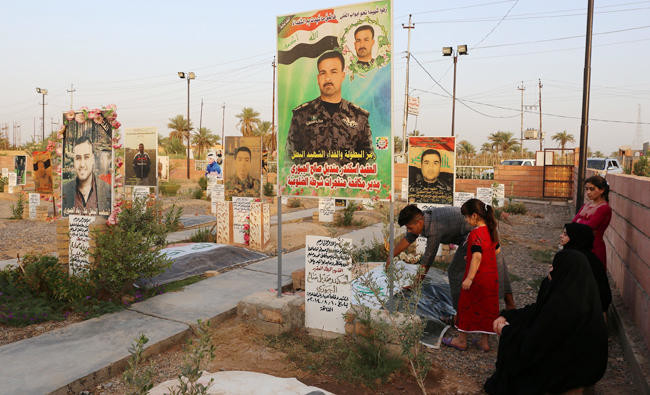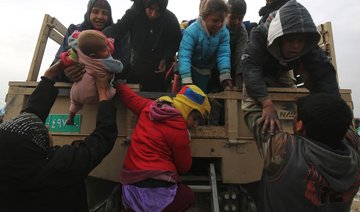DHULUIYAH, Iraq: Daesh once drew recruits from near and far with promises of paradise but now bodies of the terrorist organization’s members lie in mass graves or at the mercy of wild dogs as its “caliphate” collapses.
Flies buzz around human remains poking through the dusty earth in the Iraqi town of Dhuluiyah, 90 km north of Baghdad, at a hastily-dug pit containing the bodies of dozens of Daesh fighters killed in 2015. “They should have ended up in the stomachs of stray dogs,” local police officer Mohammed Al-Juburi told AFP.
“We buried them here not out of love but because we wanted to avoid diseases.”
At one stage, Daesh ruthlessly wielded power over a vast swathe of territory straddling Iraq and Syria, but a military onslaught on multiple fronts has seen its fiefdom shrink to a few pockets.
Since the launch in 2014 of airstrikes in Iraq and Syria against the group, a US-led coalition says around 80,000 terrorists have been killed. The overall number of dead is higher if you include those targeted by Russian and Syrian strikes.
In agricultural Dhuluiyah on the banks of the Tigris River, residents faced a common dilemma over what to do with the corpses of Daesh fighters after local Sunni militiamen beat back the terrorists in fierce clashes. “We could have thrown them into the water, but we love the river too much to pollute it,” said the local policeman, who lost his own brother in the violence.
“The people here as well as their animals drink from the Tigris.”
Local finally decided to dig a mass grave for the militants — but they said they refused to honor them with Islamic rites.
“We buried them with bulldozers. Even in the ground, they are still mired in their own filth,” said farmer Shalan Al-Juburi. “They said that they would go to paradise to enjoy the gardens of delights, but this is how they ended up.”
The desolate site is in stark contrast to a nearby graveyard surrounded by a red-brick wall a few hundred meters away. There the “martyrs” who died helping to stop the terrorists advance lie in well-tended tombs adorned with their portraits and shaded by trees.
Elsewhere, in western Iraq’s Al-Anbar province, the luckiest among the Daesh dead appear to be those killed during its offensives against the army in 2015. In the center of Fallujah, the first major city captured by the group in 2014, hundreds of memorials in a makeshift cemetery bear the noms de guerre of foreign fighters buried by their comrades.
But as Iraqi forces in Al-Anbar now look to oust the militants from their final footholds, operation commander Mahmoud Al-Fellahi insisted any terrorist killed would end up in mass graves.
A similar fate befell Daesh members in the city of Mosul, the group’s largest urban stronghold in Iraq that it lost in July.
There, a senior Iraqi commander told AFP, authorities used earthmoving equipment to bury the terrorists after we collected information on their identities and nationalities.
Across the border in Syria — where competing Russia and US-backed offensives are squeezing Daesh — the Britain-based Syrian Observatory for Human Rights estimates some 50,000 Daesh members have been killed. As clashes rage with the terrorists, one Syrian commander said that what happens to dead fighters is not a priority.
“At the moment, we are more interested in what happens above the ground than under it,” he told AFP.
Another military source said the identities of the fighters could provide useful intelligence. “The terrorists try to collect their dead. If we find them, we try to identify the foreigners for a possible information swap with their home countries,” the source said.
In the desert plains that the militants once dominated, the bodies of dead fighters are left abandoned, a pro-regime militia head told AFP.
“The desert dogs are waiting for them,” he said. “When fighting ends, the jihadists come out of their hiding places to collect the remains.”
A spokesman for the US-backed force close to ousting Daesh from the city of Raqqa said the bodies of the group’s members were “generally buried” whenever possible.
“But sometimes due to snipers or because they are under rubble, some of the bodies end up rotting,” said Syrian Defence Forces representative Mustefa Bali.
While the rank-and-file are often left forgotten, Daesh appears to have taken care to hide the final resting places of prominent Western militants. “Figures who were well-known and wanted by the international community are buried at secret locations,” said Syrian Observatory head Rami Abdel Rahman.
Those include notorious British executioner Mohamed Emwazi, known as “Jihadi John,” propaganda chief Abu Muhammad Al-Adnani and military leader Omar Al-Shishani. There has been no record of bodies of foreign militants being repatriated, said Abdel Rahman.
Once promised paradise, Daesh fighters end up in mass graves
Once promised paradise, Daesh fighters end up in mass graves

Indonesia ‘strongly rejects’ Trump’s Gaza plan

Jakarta also called on the international community to respect international law
JAKARTA: Indonesia “strongly rejects” the proposal made by President Donald Trump for the United States to assume control of Gaza and resettle Palestinians elsewhere, the Foreign Ministry said Wednesday.
Trump announced the stunning proposal Tuesday, without detailing his plans on how to move out nearly two million Palestinians from the enclave, claiming that the US will rebuild the territory and turn it into the “the Riviera of the Middle East.”
Indonesia, the world’s most populous Muslim nation, has consistently called for a two-state solution to the Israeli-Palestinian conflict.
“Indonesia strongly rejects any attempt to forcibly displace Palestinians or alter the demographic composition of the Occupied Palestinian Territory,” the Foreign Ministry said in a statement posted on social media X, formerly Twitter.
Jakarta also called on the international community to respect international law, “particularly the right to self-determination of the Palestinians as well as their inalienable right to return to their homeland,” the ministry added.
Trump claimed there was support from the “highest leadership” in the Middle East and upped pressure on Egypt and Jordan to take displaced Palestinians — despite both countries flatly rejecting the idea.
Jakarta said addressing the “root cause” of the conflict, namely “the illegal and prolonged Israeli occupation of the Palestinian territory,” was the only path to achieve a lasting peace in the region, the statement added.
Kuwaiti emir appoints new defense minister

- Sheikh Abdullah Ali Abdullah Al-Salem Al-Sabah took the oath as minister of defense
LONDON: Emir of Kuwait Sheikh Meshaal Al-Ahmad Al-Jaber Al-Sabah appointed a new defense minister to succeed Sheikh Fahad Youssef Saud Al-Sabah.
During the swearing-in ceremony at Bayan Palace on Tuesday, Sheikh Abdullah Ali Abdullah Al-Salem Al-Sabah took the oath as minister of defense.
Sheikh Fahad has assumed the position of first deputy prime minister and minister of interior following an emiri decree, according to the Kuwait News Agency.
Crown Prince Sheikh Sabah Khaled Al-Hamad Al-Sabah and other senior Kuwaiti officials attended the ceremony.
Deportation from occupied territory ‘strictly prohibited’: UN on Gaza

- “The right to self-determination is a fundamental principle of international law and must be protected by all states,” Turk said
GENEVA: UN rights chief Volker Turk insisted Wednesday that deporting people from occupied territory was strictly prohibited, after US President Donald Trump’s shock proposal for the United States to take over Gaza and resettle its people.
“The right to self-determination is a fundamental principle of international law and must be protected by all states, as the International Court of Justice recently underlined afresh. Any forcible transfer in or deportation of people from occupied territory is strictly prohibited,” Turk said in a statement.
Iraq restoration work brought back Mosul’s ‘identity’: UNESCO chief

- The director-general of United Nations heritage body UNESCO hailed the completion of their restoration work in the Iraqi city of Mosul, saying on Wednesday it had allowed it to recover its “identity”
MOSUL: The director-general of United Nations heritage body UNESCO hailed the completion of their restoration work in the Iraqi city of Mosul, saying on Wednesday it had allowed it to recover its “identity” after destruction inflicted by the Daesh group.
Mosul’s historic Al-Nuri Mosque with its famed leaning minaret, nicknamed Al-Hadba or “hunchback,” has been restored using its original brickwork, years after it was reduced to rubble under Daesh group rule.
“I am very happy to stand before you and before the minaret over 850 years old... and the fact to have it here behind me in front of you is like history coming back... is like the identity of the city coming back,” Audrey Azoulay said.
The mosque and minaret were destroyed in June 2017 during the battle to oust IS from Mosul, and Iraq’s authorities accused the jihadists of planting explosives before their withdrawal.
They are the latest landmarks in Mosul to be restored by UNESCO, whose teams have worked for five years to revive several sites.
“The reconstruction of this minaret needed to reuse nearly 45,000 original bricks,” the UNESCO chief said, adding that traditional techniques were used to rebuild the iconic structure.
Azouley said residents had wanted the rebuilt minaret to resemble the original. “The people of Mosul wanted it tilted,” she said.
Eighty percent of Mosul’s old city was destroyed in the fight against IS.
UNESCO restoration project also include Al-Tahira and Our Lady of the Hour churches and 124 heritage houses.
Prime Minister Mohammed Shia Al-Sudani will inaugurate the restored landmarks in the coming weeks.
Egypt wants Palestinian Authority to ‘assume its duties’ in Gaza: FM

CAIRO: Egypt’s Foreign Minister Badr Abdelatty called on Wednesday for the Palestinian Authority to govern the Gaza Strip, hours after President Donald Trump announced a proposal for the United States to take over the territory.
In a meeting with Palestinian Prime Minister Mohammed Mustafa, Abdelatty said Egypt was eager for the Palestinian Authority to “assume its duties in the Gaza Strip as part of the occupied Palestinian territories,” according to a foreign ministry statement.
Abdelatty called for swift reconstruction of Gaza without the displacement of Palestinians from the territory after Trump’s proposal to take it over.
The two men agreed on “the importance of moving forward with early recovery projects... at an accelerated pace... without the Palestinians leaving the Gaza Strip, especially with their commitment to their land and refusal to leave it,” the Egyptian foreign ministry said.




















